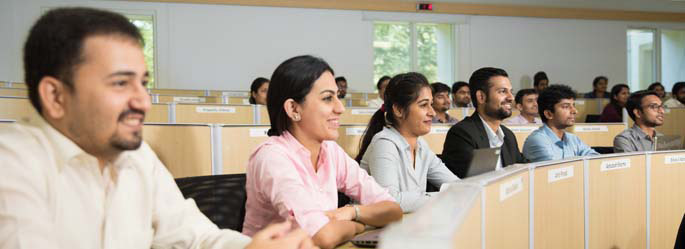Program Structure & Curriculum
Foundations

Core Business and Technology

Specializations
All students graduate with a Major and a Minor specialization. The following areas of specialization are available:

To earn a Major in a specialization, a student will need to complete a minimum of 16-18 credits from the courses in that specialization. The requirement for a Minor is a minimum of 10-12 credits.
The Honors Track
Advanced Specialization Track
During the Honors year, students super-specialize by taking up advanced courses based on pre-placement offers.
Research Track
Guided research and a 10,000-word dissertation.
Publication in a top-class peer reviewed journal
Support for enrolling into Ivy league Ph.D programs
Entrepreneurship Track
Tame the Tiger: Run with a proof of principle and incorporate an enterprise
Shadow and assist a successful Founder
The full Massachusetts Institute of Technology (MIT) Solve(ED) Social Innovation program
Electives: Marketing
Understanding Consumers; Sales & Distribution Management; Business Marketing; Marketing in the Digital Age; Building Power Brands; Platform Marketing; Rural Marketing: Tapping the Bottom of the Pyramid; IT Sales; Integrated Marketing Communication; Marketing in a Service Dominant Environment; Social Selling; Marketing Analytics: A Data Driven Approach; Mobile Marketing; Sustainable Marketing; Retail Marketing; Channel Management ALS; Pricing Optimization; Neuro Marketing; Event Marketing
Electives: Finance
Financial Statement Analysis; Bank Management; Security Analysis and Portfolio Management; Financial Markets and Institutions; Financial Derivatives; Financial Advising; Financial Modelling using Excel & VB; Insurance Management; Corporate Tax Planning; Fintech Products; Investment Banking; Business Valuation; Asset Pricing & Fund Management; Technical Analysis; Risk Management in Banks; Value Investing; Alternative Investments; Treasury Management; ESG Investing; Financial Analytics
Electives: Information Systems and Technology
IT Project Management; ERP and Business Process Management; SAP; IT Risk Management and Cyber Security; Platform Businesses; Business Analysis; Knowledge, Technology and Transformation; Creating and Managing Technology Startups; Emerging Technologies; AI and ML for Managers; Blockchain Technology and Applications; Cloud computing: Business Models; Technology Product and Service Management; Technology Consulting; Technologies and Strategies for the Digital World
Electives: Operations and Decision Sciences
Project management; Managing Quality; Strategic Sourcing; Service Operations; Reverse supply chain; Logistics management in Indian context; Forecasting Models; Operations Strategy; Modelling in operations and supply chains; Supply Chain Finance; Advanced Inventory and Lean Management; Pricing and Revenue optimization; Theory of Constraints; Advanced Optimization; Game theory; Warehousing management
Electives: Analytics
Database management and SQL; Advanced Excel; Forecasting Models; Predictive Analytics and Machine Learning; Data Mining with Orange; AI applications in Management; Digitization and analytics for competitive strategy; Social Media Analytics; HR Analytics; Healthcare Analytics; Big Data
Electives: Strategy and Interdisciplinary
Consulting Mindset, Areas and Processes; War Gaming and Scenario Planning; Data, Gut and Strategy; Jugaad, Disruption, Reverse Innovation; Managing not-for-profit entities; Entrepreneurship 101; Consulting Tools – Classical and Contemporary; Systems Thinking; Diversity and Inclusion; Circular Economy; Pathways to Net Zero; Strategic Change Management; Entrepreneurial Walkabouts; Opportunity Identification, Effectuation and Bricolage; Proof of Concept and Core Team Formation; Boot Strapping to 1K Customers; Entrepreneurial Finance
Electives: Human Resources
Labour Laws; Negotiations; Industrial Relations; Performance Management; Compensation Management; Talent Acquisition; HR Information Systems; HR Analytics; Leadership Development; Change Management; Learning and Development
International
International Immersion
Foreign languages
Course list is tentative as approved by Board of Studies. May be changed based on industry dynamics
Graduation Requirements
We follow relative grading system with grades awarded for each course. A student is expected to secure a minimum of 4.4 grade point average (GPA) in the first year and a cumulative grade point average (CGPA) of 4.4 at the end of second to progress to the third year. The requirement to graduate with a BBA is a minimum CGPA of 4.4.
To progress to the fourth year, a student needs a minimum of 6.5 CGPA. CGPA of 6.5 is also required at the end of the fourth year to earn the BBA Honors degree.
Academic Awards
T.A. Pai Gold Medal for Academic Excellence: INR 2.5 Lakhs for the topper of each BBA (Hons.) track
Dean’s Roll of Honor: INR 2 Lakhs each to the Top 3 students of the BBA Third Year




